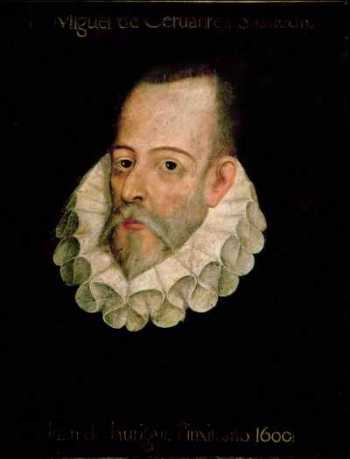September 19
Saint’s Day for Jenaro, Elías, Desiderio, and Santa María de Cervellón.
1580 - The author of Don Quijote, Miguel de Cervantes Saavedra, was freed from captivity and enslavement in Algeria on 19th September 1580 following his capture while returning to Spain in 1575.

Miguel de Cervantes Saavedra - Wikipedia
1868 - The Glorious Revolution took place in Spain in 1868, resulting in the deposition of Queen Isabella II. The success of the revolution marked the beginning of the Sexenio Democrático with the instalment of a provisional government.
In September 1868 naval forces under admiral Juan Bautista Topete mutinied in Cádiz. This was the same city where a half-century before, Rafael del Riego had launched his coup against Isabella's father.
When the generals Prim and Francisco Serrano denounced the government, much of the army defected to the revolutionary generals on their arrival in Spain. The queen made a brief show of force at the Battle of Alcolea, where her loyal moderado generals under Manuel Pavia were defeated by General Serrano.
In 1868 Queen Isabella crossed into France and retired from Spanish politics. She lived there in exile, at the Palacio Castilla in Paris, until her death in 1904.
The revolutionary spirit that had just overthrown the Spanish government lacked direction; the coalition of liberals, moderates, and republicans were faced with the incredible task of creating a government that would suit them better than had Isabella. Control of the government passed to Francisco Serrano, an architect of the revolution against Baldomero Espartero's dictatorship. The Cortes initially rejected the notion of a republic; Serrano was named regent while a search was launched for a suitable monarch to lead the country. In 1869, the Cortes wrote and promulgated a liberal constitution, the first such constitution in Spain since 1812.

https://geoghistoria.blogspot.com/
In August 1870, they selected an Italian prince, Amadeo of Savoy, The younger son of Victor Emmanuel II of Italy, Amadeo had less of the troublesome political baggage that a German or French claimant would bring, and his liberal credentials were strong. He was elected King as Amadeo I of Spain on November 3, 1870.
He landed in Cartagena on November 27, the same day that Juan Prim was assassinated while leaving the Cortes. Amadeo swore upon the general's corpse that he would uphold Spain's constitution. He lasted two years, after which the parties formed the first Spanish Republic. That in turn lasted two years. No political force was willing to restore Isabella; instead, in 1875 the Cortes proclaimed Isabella's son as King Alfonso XII.
1998 - Julio Anguita is dismissed as general secretary of the Communist Party of Spain (PCE).
Births:
1772 - Vicente López, painter (d. 1850)
1918 - Elvira Quintillá, actress.
1918 - Vicente Pozuelo Escudero, Franco's personal physician during his last years of life.
1919 - Juan Barjola, painter.
1921 - Ángel Liberal Lucini, admiral.
1928 - Elvira Quintillá, actress.
1935 - Encarnacion Jimenez Sanchez, journalist, radio host and TV presenter Spanish winner three Prizes Ondas.
1951 - Carlos Carnicero, journalist.
1956 - Helios Gómez, painter, poster designer and poet.
1956 - Jose Ramon Alexanco, footballer.
1956 - José Luis Doreste, sailor.
1959 - Karmelo C. Iribarren, poet.
1968 - Jordi Núñez, basketball player.
1971 - Alfonso Reyes Cabanas, basketball player.
1978 - Jorge López Montaña, footballer.
1980 - Carlos Gurpegi Nausea, footballer.
Deaths:
1309 - Alonso Perez de Guzman, military and noble. (b. 1256)
1591 - Alonso de Orozco, religious man and writer (b. 1500)
1961 - Juan Cristóbal González Quesada, sculptor. (b, 1897)
1980 - Ventura Gassol, poet and politician. (b. 1893)
1994 - Alberto Closas, actor. (b. 1921)
1998 - Mariano Martin, footballer. (b. 1919)
2010 - Jose Antonio Labordeta, singer, songwriter, professor writer and politician. (b. 1935)
2012 - Víctor Cabedo, cyclist (b. 1989)
